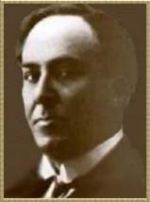Hope says
by Antonio MachadoEnglish version by Ivan M. Granger
Original Language Spanish
Hope says: One day
you will see her, if you wait well.
Says despair:
She is only your bitterness.
Beat, my heart... Not all
has been swallowed by the earth.
| -- from This Dance of Bliss: Ecstatic Poetry from Around the World, Edited by Ivan M. Granger |
<<Previous Poem | More Poems by Antonio Machado | Next Poem >>

/ Image by RezzanATAKOL /
View All Poems by Antonio Machado
This heartbreaking poem wrestles with that great empty space left by death. The "her" referred to here is Machado's wife, who died very young. Her death is an anguished absence in many of his poems.
But this poem's few lines have a quiet courage as well. The tension between hope and despair seems equal and impossible to resolve, but his soul makes a stand and gives that final nudge in favor of hope and the world of the living.
I selected this poem today to touch on some of the ways that death is a teacher, perhaps our most powerful teacher. Our own death. The death of loved ones. The small daily deaths of loss and change and uncertainty. The terrifying certainty that death eventually comes for everyone and everything.
Usually, we try not to think about death at all, or at least not with depth and an unshaken gaze. When forced to think about it directly, we tend to view death as an evil thing, a devilish force, something that breaks the way reality should work. But the simple truth that death touches every corner of the material world tells us that it is essential to reality on a certain level. Death is a universal presence, and therefore a bearer of universal truth.
Death is an essential teacher, and we each must, in our own way, overcome that reflexive fear and learn to learn from it.
It is such an immense, emotion-fraught, and shadowy subject, and I won't suggest simple, comfortable answers. Here are just a few my own thoughts and observations...
Death teaches us to let go. So much of life is spent in acquiring, gathering, and holding, but that becomes a lopsided equation. Life must include letting go, to find balance. And, I have found that, when I truly accept this, the internal act of letting go can also be a great unburdening. Letting go, in great and in small ways, can be a tremendous release, like exhaling after holding one's breath.
And, when we think about it, much of spiritual practice does exactly the same thing: teaching us to let go, to exhale, to witness the unhindered flow of life.
We can say this is about non-attachment, but I would carry this further to say this is about non-identification. By that I mean that what truly frightens us to release are the things we identify with. The things and relationships that define our own sense of self are the hardest to lose. Their loss gives us a glimpse of our own death; some part of our self definition has been broken open.
That is a big part of it, I think -- death, along with its gentler, daily form, loss, help us to see the many ways we have defined ourselves, the ways we have externalized ourselves, the ways we have tried to formulate an unchanging and limited idea of self. When pieces of that elaborate self-construction are removed or moved around, we are often traumatized, eliciting a very real encounter with death, even if physical mortality is not an immediate concern. But, we also have the opportunity to recognize that we are still essentially here. Some essential part of ourselves remains completely itself, regardless of what change or loss is experienced or how our sense of who we are has changed.
We might say that death removes the non-essential to help us discover what is essential and unchanging.
Or we can say something nearly the opposite: that death takes what is absolutely essential to us in order to awaken such a pure ache that we seek for deeper meaning, a deeper understanding of reality, and a deeper sense of self.
We can say that death comes for our stories, and only takes us when we cannot let go.
Or we can say that death metes out death until we discover we cannot die.
It would be foolish to argue against the all too blunt reality of physical death and the very real experience of loss in daily life. It is not so much that "learning" these lessons inoculates us against death and loss; rather, we come to understand them differently. Loss happens, but it is part of the eternal rhythm of movement through one's life. Death happens, but perhaps it is not the loss of self we feared. When we let go of our carefully constructed ideas of self and come to see the immense, undefined being we actually are, the flow of coming and going becomes a very different experience.
Beat, my heart... Not all
has been swallowed by the earth.
Wishing you a joyful, life-filled day today!
Recommended Books: Antonio Machado

